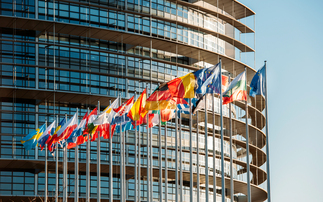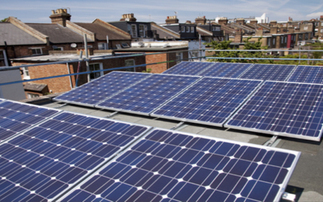Richard Black explores the jargon filled dividing lines that could yet determine whether the UN climate summit succeeds or fails
If the UN climate summit were a TV game-show, by now the portentous voice-over would be sounding something like "Four years... a hundred and ninety five countries... one objective..."
But as it's not, we'll have to stick with the mantra on the ground: "Differentiation... finance... the long-term goal..."
If a normal person were to land unexpectedly in the climate summit campus of Le Bourget this week, he or she would probably think that unbeknown to anthropologists, a section of Greater Paris had been hermetically sealed off from the rest of the world for several centuries; and while those inside had evolved to look and dress roughly the same as those outside, the lineages of both the English and French languages had diverged markedly and irretrievably, with Le Bourget-speak incomprehensible in the green fields beyond.
The UN climate process has always been a jargon-collector's dream, and this time we've been lucky enough to witness emergence of probably the longest acronym in the book - and in capital letters, too.
POTODOSO might sound like a sun-kissed Slovenian seaside resort or a tasty South Indian snack, but the reality is a little humbler, being merely the short form for "countries in a POsition TO DO SO".
It's a word that tells you a lot, though, about the political fault lines running through the entire UN climate process.
Historically, back in 1992 when Sir John Major as Prime Minister and Lord (Michael) Howard as Environment Secretary signed the UN climate convention for Britain, the world was more traditionally divided. Until shortly before that point we could legitimately talk about the First, Second and Third Worlds.
The climate convention put the First (US, Europe, Australia etc) and the Second (USSR and its satellites) into a pot within the UN climate process labelled "Annex One" or, if you prefer, "rich". The Third went into the other pot, imaginatively titled "non-Annex One" - or, as shorthand, "poor". It is, of course, a much bigger pot.
The convention says that the rich will lead in cutting emissions, the rich will help the poor financially and technically, and the rich will have more onerous requirements when it comes to measuring and reporting emissions.
But now the world has changed. There is no first, second or third world anymore. Oil-spouting Qataris and Kuwaitis dwarf even oil-guzzling Australians in terms of per-capita income. Meanwhile, many of the former Soviet bloc nations have fallen on hard times. Former US-oriented Singapore trades ever more with former USSR-oriented Vietnam. China gives more in overseas aid than the Netherlands.
So, when it comes to what happens after 2020, some in the UN's "rich" pot want this new, more confusing world order reflected. They think the newly enriched should be obliged, or at least encouraged, to supply some of the funding needed by the poorest, not least because the amount of funding needed is set to rise from its 2020 level of $100bn per year.
Hence, the call for those with POTODOSO-power to pony up; and a new acronym is off and running.
It's far from being the only jargon word that everybody here wants to get off their lips as quickly as possible so they can get into some of the very decent croissants and croques with which the French hosts are keeping us fuelled (born of the logic that happy delegates make better treaties, the French declared early on that Le Bourget would supply the best food seen at any climate summit, and - not that it's a terribly high bar, to be honest - they've delivered).
Every article I write and every broadcast I do involves a translation exercise from COP-speak to normal speak. What stands in the text as "mitigation" translates to "cutting emissions" - partly because "mitigation" is jargon, and partly because the word's normal-life meaning is perhaps closer to what the UN calls "adaptation" than what it calls "mitigation".
"Adaptation" itself becomes "protecting against climate impacts" - in the full realisation that "climate impacts" itself is a phrase that can have multiple meanings.
"Loss and damage" can become "liability and compensation for historical carbon emissions" - except to use those words is to make a political judgement, given that poor countries think the concept should have that meaning with dollar signs attached, and rich countries think it shouldn't (Although what meaning they think it should have isn't entirely clear).
And so it goes on and on; rather like some of the delegates, frankly, who bring to mind a line from the late lamented singer Jake Thackray, referencing someone who "would never use three or four words when a couple of thousand would easily do".
But there's a reason why this is all hard - why there have been 20 UN climate summits before this one, without the elusive global deal that would see all countries enacting programmes to cut emissions.
And that is simply because it matters.
All of us became rich through burning fossil fuels. They have provided us with huge amounts of cheap energy; they power our cars and trains, heat and cool our houses, and run our factories. To solve climate change, we as an entire species have to give them up, give or take carbon capture - and we have to do so in about one-third of the amount of time for which we've been using them.
It's not surprising, then, that some governments inwardly gulp at the prospect.
Nevertheless, years of diplomacy have brought us to the point where in just two or three days' time, governments may make an agreement that would go down in history as a moment when the world changed - when governments committed firmly to reducing fossil fuel use, adopting clean energy and in the process combatting climate change.
Lost in POTODOSO-land, it's easy to forget the moment's potential magnitude. But as journalists, as the people who bring Le Bourget to you, we shouldn't, because - like the problem of climate change - it is big. To have been there at the time when governments changed the course of climate history; now that really would be something.
Richard Black is director at ECIU
This article is part of BusinessGreen's Road to Paris hub, hosted in association with PwC.








